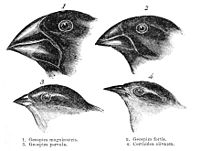
Photo from wikipedia
Since the publication of The Origin of Species by Charles Darwin, evolutionary biology has developed into a key discipline of biology and experienced several important expansions contributed by the sequential… Click to show full abstract
Since the publication of The Origin of Species by Charles Darwin, evolutionary biology has developed into a key discipline of biology and experienced several important expansions contributed by the sequential integration of Mendelian genetics, Morgan’s chromosome heredity mechanism, and Crick’s genetic central dogma theory. Especially in recent decades, next-generation sequencing has developed rapidly and provides a powerful tool for identifying candidate targets that govern the evolutionary changes, greatly promoting the study of evolutionary biology toward understanding the molecular mechanisms. More attention has been paid and funding has been devoted to this field especially in China, such as the Microevolution Project supported by the National Natural Science Foundation of China and Complex Traits Evolution Project supported by the Chinese Academy of Sciences. These initiatives greatly motivated research into evolutionary biology and a big leap has been achieved in China. However, the evolutionary mechanisms of organismal diversification over time still remain largely unresolved. Evolutionary changes can occur not only by the direct transmission from ancestors into descendants, but also in the developmental processes to produce innovative traits. The developmental process also constrains evolutionary directions. Therefore, evolution cannot be comprehensively understood without the knowledge of development biology. Numerous studies have been devoted to understanding the relationships between developmental processes and phenotypic changes during evolution, promoting the development and maturation of the subdiscipline of evolutionary developmental biology (evo-devo). Evo-devo is a subdiscipline combining evolutionary biology with developmental biology, seeking to explain the influence of developmental process on evolutionary changes in phenotype. It focuses on discovering and understanding the genetic and developmental mechanisms of the origin and evolution of key innovative traits (Hall, 2003). Its central scientific question is to reveal the molecular basis underlying morphological diversity and phenotypic changes from an evo-devo perspective. From my point of view, evo-devo has experienced three leapfrogging developmental stages. The first was marked by the identification of conserved set of gene toolkits that were commonly found among most metazoans. The second was to uncover how morphological diversity evolved and developed through the regulation of gene networks. The ongoing third stage is the introduction of multi-omics techniques, gene editing and experimental functional validation to advance our understanding of evodevo mechanisms. As a subdiscipline, evo-devo seeks to complete the conceptual framework of modern evolutionary biology. Three primary forces significantly drove the start of a new era for evo-devo studies. Firstly, integration of multiple disciplines in evolutionary research has been an overarching trend in the
Journal Title: Science China Life Sciences
Year Published: 2020
Link to full text (if available)
Share on Social Media: Sign Up to like & get
recommendations!